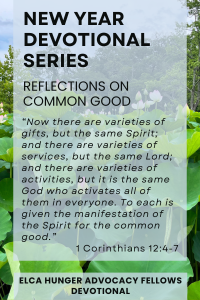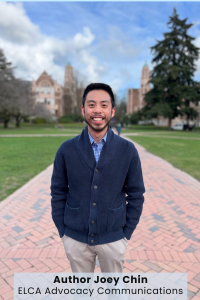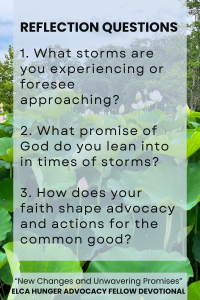by Joey Chin, Hunger Advocacy Fellow – ELCA Advocacy Communications [About the Author]

 A remarkably powerful windstorm known as a bomb cyclone devastated parts of the Pacific Northwest and Northern California about a week before Thanksgiving this past year. As I saw videos on the news of trees falling and power lines collapsing in the area I call home, I contacted family and friends to see if they were safe. Many people I knew were without power for almost a week but thankfully did not experience anything worse. Nevertheless, many homes, families and communities had to contend with the irreversible damage of the powerful storm.
A remarkably powerful windstorm known as a bomb cyclone devastated parts of the Pacific Northwest and Northern California about a week before Thanksgiving this past year. As I saw videos on the news of trees falling and power lines collapsing in the area I call home, I contacted family and friends to see if they were safe. Many people I knew were without power for almost a week but thankfully did not experience anything worse. Nevertheless, many homes, families and communities had to contend with the irreversible damage of the powerful storm.
Hearing about this weather-related event drew my thoughts to a passage in Isaiah [43:1-3].
“Do not fear, for I have redeemed you; I have called you by name; you are mine. When you pass through the waters, I will be with you, and through the rivers, they shall not overwhelm you; when you walk through fire you shall not be burned, and the flame shall not consume you. For I am the LORD your God, the Holy One of Israel, your Savior.”
In the book of Isaiah, the prophet mentions such storms when writing about the rivers, waters and flames of life. For individuals in our communities and across the globe, these storms are not metaphorical troubles but literal disasters. For the region I grew up in, the bomb cyclone was just one of many unexpected weather-related incidents that have occurred over the last few years.
PROMISES IN STORMS
Isaiah offers us a guide for how to approach these issues as people informed and guided by faith. To begin, Isaiah names that there are waters, rivers and flames to pass through. We cannot confront the most pressing problems of our time if we fail to acknowledge they exist.
Secondly, Isaiah says that as we enter into a season of taking on such challenges, God will be with us. This is a promise that should ground our work and keep us rooted in an abiding ethic of love and justice. It is a promise that provides comfort and hope while propelling us into meaningful action and change-making.
EXPERIENCES AND VALUES SHARED WITH ELECTED LEADERS
Two weeks after the bomb cyclone subsided, a group of young adults taking part in an ELCA organized climate summit visited a series of federal congressional offices to discuss the importance of addressing climate change. I had the privilege of getting to sit in at one of the meetings with a staffer from Washington state. During our time together, a few of us discussed the recent effects of the cyclone. The staffer asked how our families were doing and listened to us describe the ways in which climate change has affected our local and global communities. Everyone shared their invaluable insights, and we ended the meeting in prayer.
meetings with a staffer from Washington state. During our time together, a few of us discussed the recent effects of the cyclone. The staffer asked how our families were doing and listened to us describe the ways in which climate change has affected our local and global communities. Everyone shared their invaluable insights, and we ended the meeting in prayer.
The experience was incredibly refreshing as I watched the foundation for further work being built and established by young adult activists of faith.
SEEKING THE COMMON GOOD FOR COMMUNITIES
Last month as I flew home to Seattle to be with family for the holidays, I looked out the window of my plane amazed at the vast ocean of greenery covering the sacred ground we call home. As we enter into a new year with new changes, may we consider how our advocacy can contribute to the common good of our communities while remaining firmly rooted in the promise of a God who is with us always.
ABOUT THE AUTHOR: Joey Chin (he/him) is the Hunger Advocacy Fellow – Advocacy Communications with the ELCA advocacy staff in Washington, D.C. He grew up in the greater Seattle area and earned a degree from The University of Washington in communication and political science. Most recently Chin began pursuing Master of Divinity at Wesley Theological Seminary in Washington, D.C.
